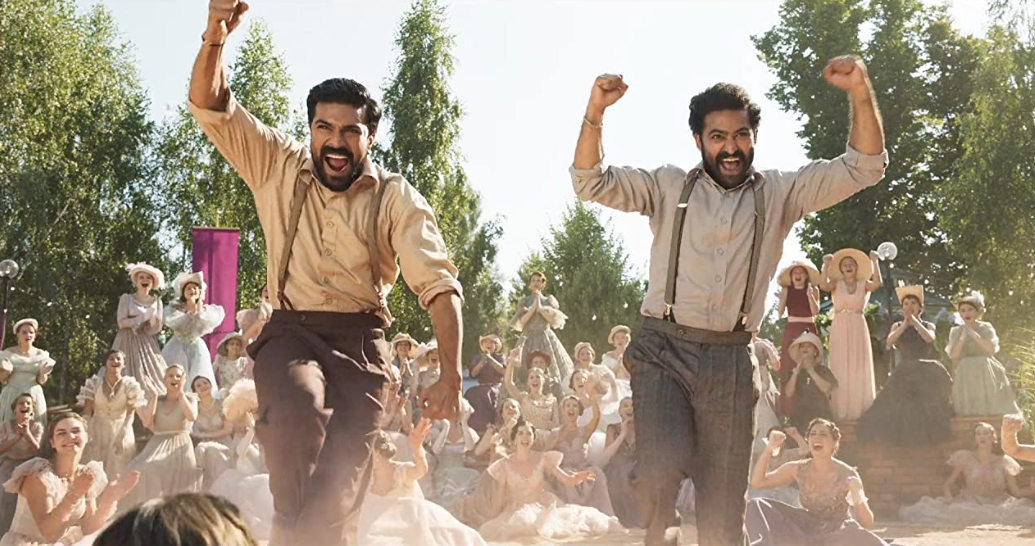
As a South Indian American, I am aware of how non-brown Americans view the Indian film industry. One word: Bollywood. Bollywood and the South Indian film industry has always been lumped into the same category as Bollywood, despite the diversity. For Indians, South India is obviously different from North India, but non-brown people assume it would all be the same. This extends beyond Indian cinema; feeding into assumptions regarding other aspects of culture like language, food, and so on. People tend to assume all Indians speak Hindi or eat tikka masala at home rather than trying to understand the diversity of Indian culture. With time, especially with the help of social media, there was more accessibility to understanding the differences among these cultures, yet nothing truly spread across the globe. Then came “RRR.”
[Read Related: On the Road to the Oscars: M.M. Keeravani and Chandrabose’s ‘Naatu Naatu’ Redefines the World’s View of Indian Music]
“RRR” is a Telugu film from Tollywood. This South Indian film has become a worldwide sensation with its incredible visual effects, captivating plot, and catchy music. I was blown away by the reception this film got in the United States, especially from American film critics who were all praise. What impressed me the most was how more Americans clarified it was not a Bollywood film, and differentiated it as a Tollywood film. The number of people taking the time to learn the difference between Tollywood and Bollywood might seem simple, yet meaningful, nonetheless. South Indian films are incredibly underrated and are finally getting the attention they deserved. It is incredible to see the celebration surrounding the film and what it represents and means to this community and how we get to share it with the world. The hype was real, and then the awards season began.
View this post on Instagram
The Golden Globes top the list of some of the major awards for television and film and it was amazing to hear that “RRR” had been nominated in two categories for this award. Funnily enough in my own world, it aired on my birthday. Then came the moment when Jenna Ortega said “Naatu Naatu, RRR” and the song played as M.M. Keeravani approached the stage to accept his award. This song became the first Asian, not only Indian, song to win the Golden Globe for Best Original Song. The 80th Golden Globes saw many wins for the Asian community with films like “Everything Everywhere All At Once” and “RRR.” There is something beautiful about being South Indian in America and watching a South Indian song win an award in America on one’s birthday. There is a joy in getting to tell my friends, both brown and non-brown, about it and share the song, “Naatu Naatu,” with them. Sure it is Indian, but it is just a bit closer to home, and that closeness stands with a beautiful meaning. When it came to the Critics’ Choice Awards, it was touching to hear about how S.S. Rajamouli grew up with the encouragement of creativity and storytelling. It honestly inspired me to continue my own projects; I hope to see them prosper as well.
[Read Related: Sri Rao and the Future of South Asian Diasporic Cinema]
After the win at the Golden Globes, the Oscars became highly anticipated for the Indian community, especially when the nominations for Best Original Song were announced. Of course, when the familiar title appeared once again, a victory felt within grasp. “Naatu Naatu” had a couple of big moments at the Academy Awards ceremony: the performance and the win itself. The performance was introduced by the absolutely phenomenal actress, Deepika Padukone, who, too, is s South Indian. Her introduction of the song brought forward the context in which the tune takes place, that is during 1920 under the British colonization of India. She reminded all of us of how significant the song was along with its catchy beat. When it came to the announcement of who won Best Original Song, it was a first-of-its-kind victory given that it was the first time an Indian film won in this category. The speech made by M. M. Keeravani was beautiful as he sang to the tune of “Top of the World” with his own lyrics to take in the moment. It was certainly an extremely proud day to be Indian anywhere in the world, and especially to be a South Indian.
Seeing non-brown folks acknowledging the diversity of Indian culture has been beautiful to witness. The cultural pride of saying an Indian film, specifically a South Indian film, won the Oscar, a Golden Globe for Best Original Song and two Critics’ Choice Awards so far is an absolute joy. Seeing South Indian representation, especially during the awards season, is inspiring for brown creatives. This has been a time of great cultural pride in the South Indian community, and as a South Indian creative myself, I am honored to see it.
Photo Courtesy: Netflix




